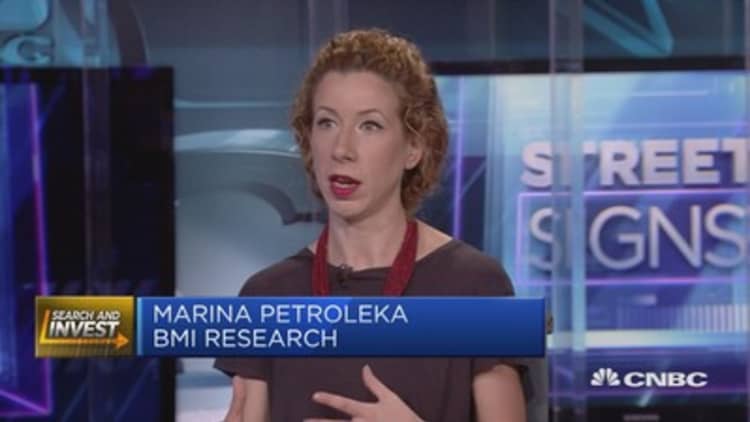
An increased appetite for emerging markets has grown in recent months, with global investors moving on following excitement over U.S and then European equities.
The MSCI Emerging Market Index has soared almost 24 percent since 2017 began. But with dollar weakness - and consequently a strong euro - set to hurt European companies, investors appear to be slowly shifting elsewhere.
"I actually think that it's more likely that investors will shift towards emerging markets … Where valuations are much more attractive," James Butterfill, head of research and investment strategy at ETF Securities told CNBC, noting that U.S. stocks are too expensive.
Interest for European equities spiked in the first half of the year with the dissipation of the populist threat across Europe, the election of Emmanuel Macron in France, and the economic improvements seen in the euro zone. But recently there's been some patchy earnings reports and a strong euro is likely to further impact profits. As of August 1, 156 companies in the pan-European STOXX 600 had reported earnings for the second quarter. Of these, 49.4 percent reported results exceeding analyst estimates, according to Reuters. In a typical quarter 50 percent beat analyst estimates.
U.S. equities have also been on the rise on expectations of big infrastructure investments and tax cuts by the new administrations. However, President Donald Trump has yet to fully concrete any of these proposals and asset managers are still wary of valuations on Wall Street. As such, emerging markets might become the next sweet spot for money managers.
"Investors are starting to see fundamentals way more attractive in emerging markets," Butterfill noted.
"We're not going to see the taper tantrum that we saw 2013," he added, saying that emerging markets no longer have current account deficits. These indicate the value of the goods and services a country imports exceeds the value of the goods and services it exports. The "taper tantrum" refers to when the U.S. Federal Reserve announced it was winding down its bond-buying program in 2013, which acutely impacted by emerging markets (EM).
The U.S. central bank is continuing to tighten its monetary policy - now with rate hikes - but analysts note that EMs are at a stronger position than they were in 2013 and the markets have also priced in the expected Fed moves.
"Even with tightening in the U.S., interest rate differentials are still positive for emerging markets," Zsolt Papp, EMD client portfolio manager at JPMorgan Asset Management, told CNBC.
"Emerging market economies are well placed to absorb the higher U.S. rates. Fed tightening comes in the context of stronger domestic U.S. and EM growth conditions and with EM economies in a substantially better fundamental position versus 2013's taper tantrum episode," he explained.
Apart from stronger current accounts, analysts have mentioned higher growth and lower inflation as other positive factors in EMs.
According to data compiled by Pictet Asset Management, strong investment spending and exports have boosted growth in EM countries in the first quarter of this year. Gross domestic product reached an average 4.3 percent across these countries, in comparison with 4 percent in the previous quarter.

"EM growth has reached its fastest pace since the third quarter of 2014. The one concern for investors could be private consumption growth, which was flat over the first quarter," Pictet Asset Management said in a research note. However, it added that it sees this metric moving higher given stronger consumer confidence, lower unemployment rates and nominal wage growth.
Consumer confidence is at its highest level in these countries since December 1993, Pictet also noted.
Papp from JPMorgan added that the situation for EM corporates has also improved as recent earnings showed. However, analysts also warned that protectionist policies and some geopolitical risks need to be monitored when assessing investments in the EM world.
"Emerging markets have returned 18 percent year-to-date so investors may be questioning whether there is more mileage and returns in this asset class," Emily Whiting, client portfolio manager at JPMorgan Asset Management, told CNBC.
Attractive returns, reasonable valuations and softening in U.S. dollar strength "are three reasons why it is not too late to invest in emerging markets," Whiting added.


